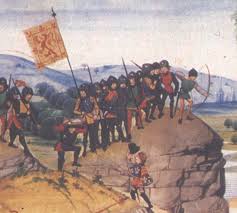As a non-Scot living in Scotland, the dynamics of the independence debate has emphasised some of the underlying assumptions about nationhood – whether one is pro-independence or pro-union.
The construction of the international order assumes ‘The Nation’ to be the space where power is located, where democratic processes can flourish and where economic and cultural priorities can be set. ‘The Nation’ is assumed to be the basic unit of politics. To my mind, this is a narrow minded and structurally conservative view of things.
Scottish Radicals tend to support independence but do so in a way that does not question the basic dynamics of the international order. This is partially due to a lack of imagination. What exactly would a world politics look like when the basic unit is no longer ‘The Nation’? No one has really answered this, as the international order is so ingrained, that we treat it as a naturally occurring phenomenon, much in the same way as we treat money and finance. Nationhood is a metaphysical construction. Only by seriously interrogating these ideological components, can ‘The Nation’s’ relation to power and how this limits our lives as citizens be fully exposed.
Power can be understood in very basic terms, as the ability to exercise influence over others. Looked at in this way, it is obvious to point out that power is not just about how one legislates within an internationally recognised legal framework, within a sovereign space. Bigger nations can always exercise power over smaller nations, but multi national companies also exercise influence when nations compete for limit investment. Private organisations and individuals can have huge influence upon how we manage our environment and lead our lives. But religious and philosophical ideas also flourish and can exercise great influence in a way that is not controlled by the state or world financial institutions.
Returning to the Scottish Independence debate, neither Scottish self-government or better government from Westminster is a panacea for the (genuine) discontents of people living in Scotland. In fact, a referendum creates a false and simplified choice. And when politicians focus on getting a result, this leads to a sophisticated environment where skilled orators can make the weaker argument sound the stronger.
Yet, by questioning the very metaphysics of nationhood, we can begin to understand and debate, what living a good life might look like. And by coming to a decision about that, we can be more creative as our understanding of politics grows in a way that is multi-dimensional, multi-faceted and without ideological dogmatism.
